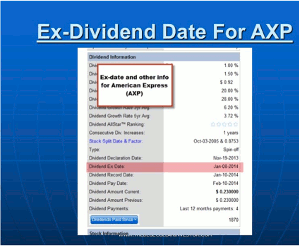Although there is no guarantee that shares will not be sold early, Alan Ellman of TheBlueCollarInvestor.com shares two methods for dramatically reducing the chance of early exercise.
Covered call writing is a low risk strategy that allows us to generate monthly cash flow by selling stock options. Since we are obligated to sell our shares to the option buyer (holder), one of the understood possibilities is that we will lose our shares at the strike price or the price we have agreed to sell our shares for mid-contract. For most of us, this is not a disadvantage but rather a positive because, if it occurs, we will have maxed our trade results and now have the cash from the sale of the stock to re-invest mid-contract.
The chance of early assignment (option exercised and shares sold prior to expiration Friday) is extremely rare. When it does occur it is usually related to a dividend distribution. The general rule is that if the ex-dividend date (date we must own the shares to be eligible to earn the dividend) is prior to the expiration date of the option, and the time value of the premium is less than the dividend about to be distributed, the chance of early exercise is much greater but not guaranteed.
This article is geared to those who use covered call writing in their buy and hold portfolios to generate higher annualized returns but do not want their shares sold. Usually, these portfolios are held in non-sheltered accounts with securities that have a low cost basis and there are tax issue concerns if shares are sold. For some, these shares have been generating monthly dividends that we would like to continue to flow.
Let me premise my remarks by saying that we can never guarantee that our shares will not be sold early because retail investors make mistakes. So, even if it makes no sense to exercise early, some may, and those exercise notices may randomly end up in our accounts. Likely? No. Possible? Yes.
Assumptions:
- Ex-dividend date is prior to expiration Friday
- Time value component of the option premium < the dividend about to be distributed
- We don’t want our shares sold
2 Methods of dramatically reducing the chance of early exercise:
The first step is to locate ex-dividend date data for the security as shown in the screenshot below for American Express (AXP):

Ex-dividend date stats for American Express
Click to Enlarge
The site I used to access this information:
www.dividendinvestor.com
- If the ex-date is in the first week of a contract, sell the option the day after the ex-date (and still capture three weeks of time value).
- If the ex-date is later in the contract, sell a 2-month option after expiration of the previous contract. When the ex-date is not close to the expiration of the contract, an option holder will rarely exercise early.
Conclusion:
There are methods we can employ to dramatically decrease any chance of early exercise due to dividend distribution but we can never be 100% certain of avoiding such events because of potential errors made by retail investors (may “spend a dollar to make 50 cents”).
By Alan Ellman of TheBlueCollarInvestor.com










